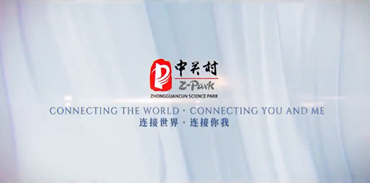Profile
The Zhongguancun National Demonstration Zone dates back to the "Zhongguancun Electronics Street" in the early 1980s. In May 1988, the State Council approved the establishment of the Beijing New Technology Industrial Development Trial Zone (predecessor of the Zhongguancun Science and Technology Park). Thus Zhongguancun became the first high-tech park in China.
On March 13, 2009, the State Council approved the construction of the Zhongguancun National Demonstration Zone, and made the plan to build Zhongguancun a S&T innovation center with a global influence,. Later the Development Plan Outline for Zhongguancun National Demonstration Zone (2011-2020), was launched by the State Council on Jan 26, 2011, marking a new starting point for Zhongguancun's development.
During the past two decades, Zhongguancun has gathered nearly 20,000 high and new-tech enterprises, represented by Lenovo and Baidu, and has formed a high and new-tech industrial cluster featuring electronic information, biomedicine, energy and environmental protection, new materials, advanced manufacturing, aerospace, R&D and service.
Zhongguancun is the most intensive scientific, education and talent resource base in China. It boasts almost 40 colleges and universities like Peking University and Tsinghua University, more than 200 national (municipal) scientific institutions such as the Chinese Academy of Social Sciences and the Chinese Academy of Engineering, 67 state-level laboratories, 27 national engineering research centers, 28 national engineering and technological research centers, 24 university S&T parks and 29 overseas student pioneer parks.
Zhongguancun is one of the "innovation and entrepreneurial base for overseas talents" conferred by the Central Personnel Work Coordination Group. There are more than 5,000 enterprises with at least 15,000 overseas returnees. The entrepreneur representatives include Lenovo president Liu Chuanzhi and Li Yanhong, president of Baidu, and Kai-Fu Lee, Google Greater China's former CEO and the president of Innovation Works.
Zhongguancun's venture capital cases and investment amount every year account for about a third of the country's total. Today, the number of listed companies in the zone adds up to 189, comprising of 113 domestic and 76 overseas companies. As many as 38 enterprises have been listed on the Chinese Growth Enterprise Market. Zhongguancun plans to establish a national S&T financial innovation center that involves government and social funds, industrial and financial capital, and direct and indirect finances.
To meet the national strategic requirements and Beijing's needs for socioeconomic development, Zhongguancun has obtained a large number of key technical breakthroughs, innovation results and critical S&T innovations, such as the super computer, human vaccines against SARS and bird flu. Zhongguancun also provided technical support for the implementation of major state construction projects, including aerospace engineering, the Three Gorges Project, and the Qinghai-Tibet Highway construction.
Zhongguancun enterprises have formulated 86 important international standards like TD-SCDMA, McWill and IGRS, and 798 national, local and industrial standards. Its technology transaction values exceed a third of the country's total, including 80 percent of project products and services exported outside Beijing.
In 2010, the gross income of enterprises in Zhongguancun achieved 1.59 trillion yuan, an increase of 22.6 percent, taking up about one seventh of all high and new-tech zones in China and contributing 23.5 percent to Beijing's economic growth.
Currently, Zhongguancun is home to 10 parks, namely, Haidian, Fengtai, Changping, Electronics City, Yizhuang, Desheng, Yonghe, Shijingshan and Tongzhou Parks as well as the Daxing Biomedicine Industrial Base.
During the 12th Five-Year Plan period, Zhongguancun will further improve its Science and Future S&T Cities, promote the development of the northern R&D service and high-tech industrial belt, which are located in North Haidian, South Changping, as well as the southern high-tech manufacturing and emerging industrial belt consisting of the Beijing Economic-Technological Development Area and partial areas of Daxing, Tongzhou and Fangshan districts.
The Zhongguancun Demonstration Zone will further open to the world and serve Beijing as it develops into a global city. Plans for the demonstration zone includes an international science and technology innovation center to be built within a decade.

